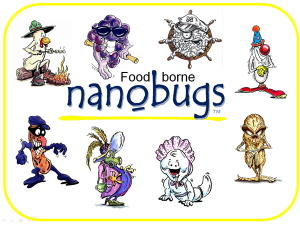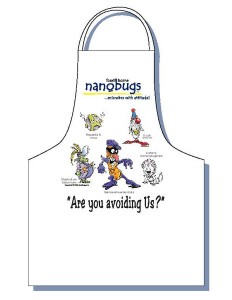01 May The Lincoln Food Safety Initiative – to nourish a strong and healthy community
 Food recalls, outbreaks of foodborne illness, contaminated produce – making headlines almost every week. My community, Lincoln, Nebraska, has recently been touched by foodborne illness like so many others in the USA. It is time that communities unite to educate and demonstrate food safety. Public health and federal regulatory agencies cannot do it alone. Nanobugs, inc is launching the Lincoln Food Safety Initiative this month to put the nanobugs to work engaging people of all ages to learn relevant microbiology and food safety. We believe that if everyone knows what the pathogenic microbes like (temperatures, living conditions, kinds of food they inhabit, etc), we can sabotage their growth and survival in our food. Here is an overview of the Lincoln Food Safety Initiative:
Food recalls, outbreaks of foodborne illness, contaminated produce – making headlines almost every week. My community, Lincoln, Nebraska, has recently been touched by foodborne illness like so many others in the USA. It is time that communities unite to educate and demonstrate food safety. Public health and federal regulatory agencies cannot do it alone. Nanobugs, inc is launching the Lincoln Food Safety Initiative this month to put the nanobugs to work engaging people of all ages to learn relevant microbiology and food safety. We believe that if everyone knows what the pathogenic microbes like (temperatures, living conditions, kinds of food they inhabit, etc), we can sabotage their growth and survival in our food. Here is an overview of the Lincoln Food Safety Initiative:
Our Vision: Creating infection-free families in every community that take responsibility for their own health and develop effective strategies for infection prevention.
Mission of the Lincoln Food Safety Initiative: To engage and equip residents of Lincoln, Nebraska with enough knowledge of practical microbiology and incentive to develop effective strategies for the prevention of foodborne illness in their family circle.
Who Benefits?
People of all ages in the Lincoln community; especially those residing in families with the support and advocacy of mothers and those at higher risk of infection (like seniors, babies and the immune suppressed).
Who Leads and Contributes to this Mission?
Lincoln businesses connected in any and every way to the access to food, food preparation and storage, and dining of Lincoln residents. We will call them “Food Safety Advocates” or “Food Safety Support Team”.
Where? Lincoln, Nebraska, USA (Share our outcomes later with other communities in US, UK and Canada.)
When? 2016 and beyond
Why? Public health policies and regulations are in place and health inspections are conducted to insure food safety where food is prepared and purchased outside the home. However, many foodborne infections can be avoided if families apply food safety strategies and techniques in their own home, picnics, potlucks and tailgating.
Additionally, the problem of antibiotic resistance is a growing threat to our health that must be addressed by everyone. The good news is: If you prevent infections, you don’t have to treat them. This will, in turn, help reduce the abuse, misuse and overuse of antibiotics that contribute to the development of antibiotic resistance.
What will we do? Ultimately, we will provide focused “STEM education for the masses” related to food safety. We will help families to identify and implement relevant techniques and strategies that apply to their home and family situation (rather than just reviewing “the rules” with them); Review grocery shopping and food storage techniques (including explanations of “sell by” “best by” and “use by” dating systems for packaged food), and kitchen management and hygiene in the home.
Tools and Strategies: The nanobugs will serve to engage audiences of all ages and teach practical microbiology and infection prevention. Our primary strategy is to “vilify the microbe that causes the foodborne infection” rather than the food service worker, the manufacturer, restaurant, grocer or produce item. Food safety requires a knowledge of the microbes, the foods they commonly occupy and how to avoid them, prevent or slow their multiplication or eliminate them.
The forth-coming book: Nanobugs in the Kitchen – a food safety guide for busy mothers will provide a resource for families. The companion adult coloring book will further engage mothers and their families. Timely newspape r feature articles will provide information and creative approaches to the issues surrounding food safety. Temporary tattoos of the foodborne nanobugs will help engage and teach children the importance of microbiology as it relates to prevention of foodborne illness.
r feature articles will provide information and creative approaches to the issues surrounding food safety. Temporary tattoos of the foodborne nanobugs will help engage and teach children the importance of microbiology as it relates to prevention of foodborne illness.







Sorry, the comment form is closed at this time.